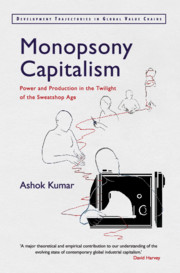7 - Labour's Power in the Chain
from FUTURE
Published online by Cambridge University Press: 15 January 2020
Summary
On 17 September 1982, David Dubinsky died aged 90. An obituary in the New York Times described a life of commitment to the ILGWU, where he had served as President for more than three decades, from 1932 to 1966 (Raskin 1982). Born in what is now Belarus, at the age of 13 he was already working as a unionized baker and, during the failed Russian revolution of 1905, took inspiration from a mass rally for the Jewish Workers Union, or Bund. The next year, at the age of 14, he was elected its Assistant Secretary. And after several arrests for union-related activities, including attempts to organize strikes, he escaped from police custody while en route to Siberia. In 1911, he appeared in New York City. By 1932, the 5 feet 4 inches Dubinsky was running an American union: the ILGWU, which had been organized out of New York City's garment district. Buoyed by the jobbers’ agreement (JA) strategy, union membership soared under his leadership. His detractors, however, accused the Belarusian of supporting imperialism, undermining strikes, and ‘collaborating with manufacturers to fleece the consuming public’ (Weinstone 1946: 13). The end of Dubinsky's presidency coincided with the end of an era, as the jobbers’ strategy concluded, and globalization swept the garment sector out of New York City and London and into the Third World. As Chapter 2 details, in the early twentieth century, the ILGWU was forced to confront a new, vertically disintegrated business model, one that would become a commonplace across industrial capitalism and spread across the world. This system of outsourced production made direct negotiations with low-value employers very difficult, leading to a war of attrition.
On the face of things, it is the suppliers/producers who are responsible for the wages and working conditions of shop floor labour, since they are the ones who set wage policy and maintain the factories. But suppliers – however villainous or well-intentioned their owners may be – operate within the limits imposed on them by buyers through the value chain. And when buyers have high degree of monopsony power (DMP), they can demand a lot for very little, pushing down margins and giving labour much less to bargain for.
But the ILGWU's efforts were not entirely in vain.
- Type
- Chapter
- Information
- Monopsony CapitalismPower and Production in the Twilight of the Sweatshop Age, pp. 205 - 228Publisher: Cambridge University PressPrint publication year: 2020

